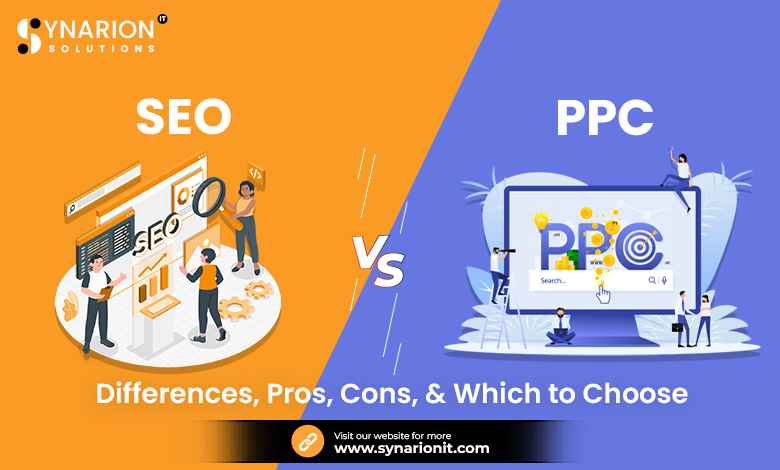SEO vs PPC: Differences, Pros, Cons, & Which to Choose

Introduction
In the dynamic world of digital marketing, two key strategies stand out: Search Engine Optimization (SEO) and Pay-Per-Click (PPC) advertising. Both are powerful tools for driving traffic to websites, yet they differ significantly in approach, execution, and outcomes. Understanding these differences, along with their respective advantages and disadvantages, is crucial for businesses aiming to maximize their online presence and marketing effectiveness.
What is SEO?
SEO refers to the practice of optimizing a website to rank higher in organic search engine results. Unlike PPC, which involves paying for ad placements, SEO focuses on improving a site’s visibility through unpaid (organic) methods. The goal is to attract more traffic from search engines like Google, Yahoo, and Bing by aligning the website’s content, structure, and other factors with the search engine algorithms.
Keywords and Content Optimization
Central to SEO is keyword optimization. Keywords are phrases that users type into search engines to find information relevant to their queries. For instance, a company specializing in SEO services would optimize its content to include meta tags, headers, and URLs, all designed to enhance a site’s relevance to specific keywords.
Benefits of SEO
Cost-Effective
Unlike PPC, SEO does not require ongoing payments for clicks. Once optimized, organic traffic can continue flowing without additional spending.
Long-Term Results
SEO efforts can yield sustained visibility and traffic over time, even after initial optimization.
Credibility
Higher organic rankings are often perceived as more credible by users than paid advertisements.
Targeted Traffic
SEO targets users actively searching for specific products or services, making it highly relevant.
Challenges of SEO
Time-Intensive
Achieving top rankings can take months or even years, requiring consistent effort.
Algorithm Changes
Search engines frequently update their algorithms, necessitating ongoing adjustments to SEO strategies.
Competitive
High-ranking positions are fiercely contested, especially for popular keywords in competitive industries.
What is PPC?
PPC, or Pay-Per-Click advertising, involves bidding on keywords to display ads prominently in search engine results and other platforms. Advertisers pay each time a user clicks on their ad, hence the term “pay-per-click.” This model allows businesses to target specific keywords and demographics, ensuring their ads appear to relevant audiences.
Keyword Targeting and Ad Creation
In PPC campaigns, advertisers select keywords relevant to their products or services. For instance, a company offering PPC marketing services would bid on keywords like PPC management, paid search advertising, and similar phrases. Advertisers also create compelling ad copy and select appropriate landing pages to maximize conversions from ad clicks.
Benefits of PPC
Immediate Results
PPC campaigns can drive traffic and generate leads almost instantly after launch.
Control and Flexibility
Advertisers have precise control over budget, targeting options, and ad placements.
Measurable ROI
PPC platforms provide detailed analytics, allowing advertisers to track performance metrics like clicks, conversions, and costs.
Highly Targeted
Ads can be tailored to specific demographics, locations, and user behaviors.
Challenges of PPC
Cost
Click costs can escalate quickly, especially for competitive keywords or broad targeting.
Dependence on Budget
Once ad spending stops, traffic from PPC campaigns also ceases.
Click Fraud
Some malicious entities may click on ads without genuine interest, potentially wasting ad spend.
Ad Fatigue
Users may become desensitized to repetitive ads, reducing their effectiveness over time.
Which to Choose: SEO or PPC?
The decision between SEO and PPC depends on various factors, including budget, timeline, and marketing goals.
Choose SEO if
Long-Term Strategy: You seek sustainable, organic traffic growth over time.
Limited Budget: You prefer not to incur ongoing costs per click.
Establishing Authority: Building credibility and authority in your niche is a priority.
Patience for Results: You can wait for SEO efforts to yield results gradually.
Choose PPC if
Immediate Impact: You need to drive traffic and conversions quickly.
Flexible Budget: You have the budget to invest in paid advertising.
Testing and Iteration: You want to quickly test different marketing messages and strategies.
Targeted Campaigns: Your goal is to reach specific demographics or geographic locations.
Conclusion
In summary, both SEO and PPC offer distinct advantages and challenges in the realm of digital marketing. SEO provides long-term benefits and credibility, making it ideal for sustainable growth and establishing authority. In contrast, PPC offers immediate visibility and control, making it suitable for short-term campaigns and precise targeting. Ultimately, the best approach often involves a combination of both strategies, tailored to the unique goals and resources of each business. By understanding these differences and aligning them with specific objectives, businesses can optimize their digital marketing efforts effectively.



